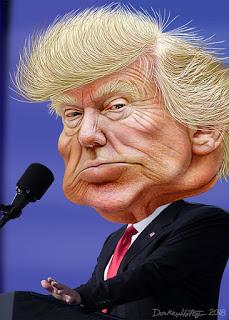 (This caricature of scandal-ridden Donald Trump is by the inimitable DonkeyHotey.)
(This caricature of scandal-ridden Donald Trump is by the inimitable DonkeyHotey.)Is the Trump scandal the biggest in United States history? A good case can be made that it is.
Here's what Jim VandeHei and Mike Allen of Axios had to say on the subject:
Even without seeing Robert Mueller's report, or knowing what prosecutors with the Southern District of New York have unearthed, or what congressional investigators will find, we already have witnessed the biggest political scandal in American history. Historians tell Axios that the only two scandals that come close to Trump-Russia are Watergate, which led to President Richard Nixon's resignation in 1974, and the Teapot Dome scandal of the early 1920s, in which oil barons bribed a corrupt aide to President Warren Harding for petroleum leases.
- Mueller has already delivered one of the biggest counterintelligence cases in U.S. history, author Garrett Graffpoints out — up there with Aldrich Ames (a former CIA officer convicted in 1994 of being a KGB double agent), or Julius and Ethel Rosenberg (executed in 1953 for spying for the Soviets).
- Watergate yielded more charges than Mueller has so far: A total of 69 people were charged in Watergate; 48 people and 20 corporations pleaded guilty. Mueller so far has indicted 27 people; seven have been convicted or pleaded guilty.
- But historians say that both Watergate and Teapot Dome were more limited because a foreign power wasn't a central player, and a much narrower band of potential offenses was under investigation.
- A fourth notable scandal, the Iran-Contra affair of the mid-1980s — in which arms were traded for hostages held by Iran, with the money used to fund rebels in Nicaragua — also involved a more limited range of issues.
- The historical parallel: Bill Clinton was impeached (but acquitted by the Senate) for lying under oath about an affair with a White House intern.
- Clinton impeachment Article 3, passed by the House, was obstruction of justice.
- Earlier presidents, or their friends, had also been known to pay off mistresses.
- The historical parallel: None.
- The historical parallel: None.
- The historical parallel: None.
- The historical parallel: In the "Saturday Night Massacre" of 1973, Nixon tried to stop the Watergate investigation by abolishing the office of Watergate prosecutor Archibald Cox; and accepting the resignation of Attorney General Elliot Richardson, and firing Deputy Attorney General William Ruckelshaus, when they refused to fire Cox.
- The historical parallel: None.
- "We’re in the midst of making history more than we are reflecting it."

